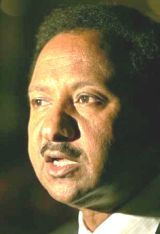Sudanese FM – West is Ignoring new crisis in eastern Sudan
Sept 14, 2005 (UNITED NATIONS) — Sudan’s foreign minister said Wednesday that the West is ignoring a new crisis in the eastern part of the country, and that he expects no action until it becomes a full-blown conflict with people dying and refugees fleeing.
 In an exclusive interview with The Associated Press, Minister Mustafa Osman Ismail also charged European Union sanctions were one of the catalysts that caused the crisis in Darfur, where at least 180,000 people have died in the conflict and ensuing chaos – many from hunger and disease. An estimated 2.74 million survivors are affected, more than 60% of them women and children, according to the U.N. Children’s Fund.
In an exclusive interview with The Associated Press, Minister Mustafa Osman Ismail also charged European Union sanctions were one of the catalysts that caused the crisis in Darfur, where at least 180,000 people have died in the conflict and ensuing chaos – many from hunger and disease. An estimated 2.74 million survivors are affected, more than 60% of them women and children, according to the U.N. Children’s Fund.
Speaking on the periphery of the U.N. World Summit, Ismail also complained that the U.S. is slow in acting on promises to lift sweeping economic sanctions and in coming forth with aid.
“They promised once we signed the peace agreement (to end the war in southern Sudan), that sanctions would be lifted and aid would come, and we signed it,” Ismail said. “Now they say the situation in Darfur has to be resolved (first).”
Peace talks are scheduled Thursday in Nigeria’s capital, Abuja, but the main rebel Sudanese Liberation Movement is refusing to participate, Ismail said. He said the movement was split in two but he thought might respond to international pressure, including from the U.S. and the African Union.
Sudan, one of Africa’s largest land masses and about a quarter the size of the U.S., sprawls across 2.5 million square kilometers with borders with nine East, Central and North African nations and a population of more than 40 million. It suffered civil war for 21 years.
Rebels in the south took up arms in 1983 demanding more autonomy in a conflict that pitted mainly Christian and animist southerners against a government dominated primarily by Arab Muslims. That war left some 2 million people dead from fighting, famine or disease
The conflict in Darfur, a region the size of France, began when rebels from ethnic African tribes took up arms in February 2003, complaining of discrimination and oppression by the government.
Sudan’s previously Islamic-oriented government has been accused of unleashing Arab tribal militia known as the Janjaweed against civilians in a campaign of murder, rape and arson.
Ismail said the government may have had an excessive reaction but rejects the characterization of the conflicts as religious- or ethnic-based. He said the southern war was a political fight for power and Darfur’s is an extreme example of growing conflicts between nomadic and sedentary tribes need for land and water as the semi-desert nation suffers desertification and drought.
Such was the case when Darfur erupted, he said.
The E.U. introduced sanctions during the war in the south, Ismail said, that was mainly used to provide water, electricity and irrigation for agricultural projects in Darfur, where farmers grew sugar and maize.
“As a result, the project in Darfur collapsed in the early 1990s; in the mid-90s we have a drought and continuing desertification attacks the area and it created a point of conflict between settled tribes and nomadic tribes, who were having difficulty finding water and moving further and further south.” The EU lifted those sanctions in January.
He said the nomads, desperate for water, violated a centuries-old understanding set up by U.K. colonizers who instituted corridors of land for nomads to move through farmland, corridors that farmers were prohibited from cultivating. When the nomads invaded farmland, angry farmers began growing crops in the corridors, and isolated fisticuffs erupted into a conflict in western Sudan.
Now, Ismail said, a similar problem looms: “In the eastern part of Sudan, we are telling them (donors) that people don’t have food and don’t have medicine” but no one is responding.
“Unfortunately they will come after there is loss of life, after the people have left their homes and because displaced and refugees then the international community will come.
“This is the dilemma” shown in part by a much watered-down resolution to resolve hunger and poverty presented to leaders at the U.N. World Summit this week, he said.
The international community responds generously to disasters, but is unwilling to act to prevent crises:
“We told them,” during bitter negotiations on the resolution this week, “if you had spent half the money which you are spending now in Darfur before, this tragic situation would never have taken place in Darfur.”
(AP/ST)
